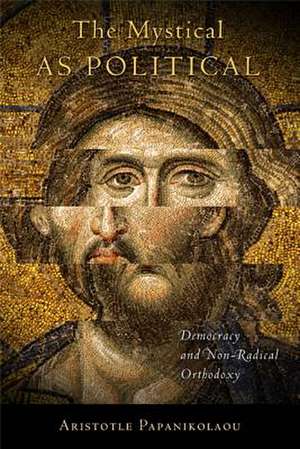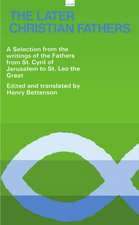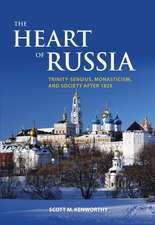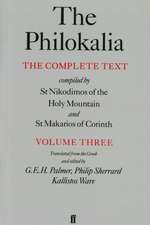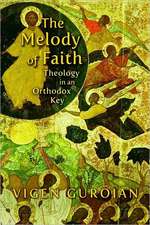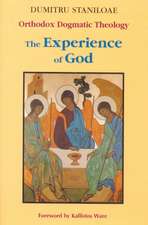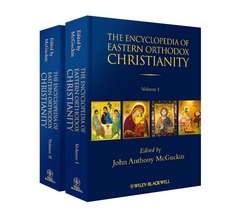The Mystical as Political
Autor Aristotle Papanikolaouen Limba Engleză Paperback – 29 oct 2012
Theosis, or the principle of divine-human communion, sparks the theological imagination of Orthodox Christians and has been historically important to questions of political theology. In The Mystical as Political: Democracy and Non-Radical Orthodoxy, Aristotle Papanikolaou argues that a political theology grounded in the principle of divine-human communion must be one that unequivocally endorses a political community that is democratic in a way that structures itself around the modern liberal principles of freedom of religion, the protection of human rights, and church-state separation.
Papanikolaou hopes to forge a non-radical Orthodox political theology that extends beyond a reflexive opposition to the West and a nostalgic return to a Byzantine-like unified political-religious culture. His exploration is prompted by two trends: the fall of communism in traditionally Orthodox countries has revealed an unpreparedness on the part of Orthodox Christianity to address the question of political theology in a way that is consistent with its core axiom of theosis; and recent Christian political theology, some of it evoking the notion of “deification,” has been critical of liberal democracy, implying a mutual incompatibility between a Christian world view and that of modern liberal democracy.
The first comprehensive treatment from an Orthodox theological perspective of the issue of the compatibility between Orthodoxy and liberal democracy, Papanikolaou’s is an affirmation that Orthodox support for liberal forms of democracy is justified within the framework of Orthodox understandings of God and the human person. His overtly theological approach shows that the basic principles of liberal democracy are not tied exclusively to the language and categories of Enlightenment philosophy and, so, are not inherently secular.
"Aristotle Papanikolaou’s The Mystical as Political is a stellar contribution to the analysis of Orthodox thought and also to current debates about theology and politics. For too long scholars in the Western academy have failed to engage the resources and insights of Orthodox theology. This book aptly shows those resources and insights in a way that marks a genuine advance in thought. The Mystical as Political rewards its reader with fresh insight into the complex relation between faith and politics. Papanikolaou is a rising star on the theological scene. This book deserves wide readership as a crucial theological contribution to debates about our political and personal lives." —William Schweiker, University of Chicago
"In The Mystical as Political, Papanikolaou not only guides readers through the rich legacy of Eastern Orthodox political thought, from the formative struggles of the pre-Constantinian era to the post-Enlightenment, post-Ottoman, and post-Communist challenges encountered today, but also presents a compelling argument that Orthodoxy's goal of 'divine-human communion' can—and should—include core elements of modern liberal democracy and the human rights tradition. This study signals a new phase in political theology for Orthodox and non-Orthodox alike, and it secures Papanikolaou's place as one of today's leading Orthodox thinkers and theological bridge-builders." —Perry T. Hamalis, North Central College
“Aristotle Papanikolaou’s The Mystical as Political will be the standard Eastern Orthodox text in classes on theology and politics. It evinces a thorough engagement with the current debates in theology and politics, a rich awareness of the theological issues at stake, and a crisply distinctive position of its own. It will be enormously educational for classroom use, as well as being an immense contribution to the scholarly conversations on these matters.” —Charles Mathewes, University of Virginia
Papanikolaou hopes to forge a non-radical Orthodox political theology that extends beyond a reflexive opposition to the West and a nostalgic return to a Byzantine-like unified political-religious culture. His exploration is prompted by two trends: the fall of communism in traditionally Orthodox countries has revealed an unpreparedness on the part of Orthodox Christianity to address the question of political theology in a way that is consistent with its core axiom of theosis; and recent Christian political theology, some of it evoking the notion of “deification,” has been critical of liberal democracy, implying a mutual incompatibility between a Christian world view and that of modern liberal democracy.
The first comprehensive treatment from an Orthodox theological perspective of the issue of the compatibility between Orthodoxy and liberal democracy, Papanikolaou’s is an affirmation that Orthodox support for liberal forms of democracy is justified within the framework of Orthodox understandings of God and the human person. His overtly theological approach shows that the basic principles of liberal democracy are not tied exclusively to the language and categories of Enlightenment philosophy and, so, are not inherently secular.
"Aristotle Papanikolaou’s The Mystical as Political is a stellar contribution to the analysis of Orthodox thought and also to current debates about theology and politics. For too long scholars in the Western academy have failed to engage the resources and insights of Orthodox theology. This book aptly shows those resources and insights in a way that marks a genuine advance in thought. The Mystical as Political rewards its reader with fresh insight into the complex relation between faith and politics. Papanikolaou is a rising star on the theological scene. This book deserves wide readership as a crucial theological contribution to debates about our political and personal lives." —William Schweiker, University of Chicago
"In The Mystical as Political, Papanikolaou not only guides readers through the rich legacy of Eastern Orthodox political thought, from the formative struggles of the pre-Constantinian era to the post-Enlightenment, post-Ottoman, and post-Communist challenges encountered today, but also presents a compelling argument that Orthodoxy's goal of 'divine-human communion' can—and should—include core elements of modern liberal democracy and the human rights tradition. This study signals a new phase in political theology for Orthodox and non-Orthodox alike, and it secures Papanikolaou's place as one of today's leading Orthodox thinkers and theological bridge-builders." —Perry T. Hamalis, North Central College
“Aristotle Papanikolaou’s The Mystical as Political will be the standard Eastern Orthodox text in classes on theology and politics. It evinces a thorough engagement with the current debates in theology and politics, a rich awareness of the theological issues at stake, and a crisply distinctive position of its own. It will be enormously educational for classroom use, as well as being an immense contribution to the scholarly conversations on these matters.” —Charles Mathewes, University of Virginia
| Toate formatele și edițiile | Preț | Express |
|---|---|---|
| Paperback (1) | 273.67 lei 6-8 săpt. | |
| MR – University of Notre Dame Press – 29 oct 2012 | 273.67 lei 6-8 săpt. | |
| Hardback (1) | 589.69 lei 6-8 săpt. | |
| MR – University of Notre Dame Press – 29 sep 2022 | 589.69 lei 6-8 săpt. |
Preț: 273.67 lei
Nou
Puncte Express: 411
Preț estimativ în valută:
52.39€ • 53.91$ • 44.16£
52.39€ • 53.91$ • 44.16£
Carte tipărită la comandă
Livrare economică 28 februarie-14 martie
Preluare comenzi: 021 569.72.76
Specificații
ISBN-13: 9780268038960
ISBN-10: 0268038961
Pagini: 248
Dimensiuni: 152 x 228 x 17 mm
Greutate: 0.36 kg
Ediția:1st Edition
Editura: MR – University of Notre Dame Press
ISBN-10: 0268038961
Pagini: 248
Dimensiuni: 152 x 228 x 17 mm
Greutate: 0.36 kg
Ediția:1st Edition
Editura: MR – University of Notre Dame Press
Recenzii
"Aristotle Papanikolaou’s The Mystical as Political is a stellar contribution to the analysis of Orthodox thought and also to current debates about theology and politics. For too long scholars in the Western academy have failed to engage the resources and insights of Orthodox theology. This book aptly shows those resources and insights in a way that marks a genuine advance in thought. The Mystical as Political rewards its reader with fresh insight into the complex relation between faith and politics. Papanikolaou is a rising star on the theological scene. This book deserves wide readership as a crucial theological contribution to debates about our political and personal lives." —William Schweiker, University of Chicago
"In The Mystical as Political, Papanikolaou not only guides readers through the rich legacy of Eastern Orthodox political thought, from the formative struggles of the pre-Constantinian era to the post-Enlightenment, post-Ottoman, and post-Communist challenges encountered today, but also presents a compelling argument that Orthodoxy's goal of 'divine-human communion' can—and should—include core elements of modern liberal democracy and the human rights tradition. This study signals a new phase in political theology for Orthodox and non-Orthodox alike, and it secures Papanikolaou's place as one of today's leading Orthodox thinkers and theological bridge-builders." —Perry T. Hamalis, North Central College
“Aristotle Papanikolaou’s The Mystical as Political will be the standard Eastern Orthodox text in classes on theology and politics. It evinces a thorough engagement with the current debates in theology and politics, a rich awareness of the theological issues at stake, and a crisply distinctive position of its own. It will be enormously educational for classroom use, as well as being an immense contribution to the scholarly conversations on these matters.” —Charles Mathewes, University of Virginia
“The strength of the book is that it tries to develop a positive understanding of the political based on the central element of the Christian faith without succumbing to tendencies toward utopism or theocracy. . . . by engaging discussing partners from different ecclesial traditions, Papanikolaou succeeds in showing the ecumenical relevance of his approach, even if it from the outset is grounded in Orthodox theology.” —Teologisk Tidsskrift
“Papanikolaou’s The Mystical as Political is a welcome addition to current debates in political theology. His emphasis on the importance of theosis or divine-human communion marks a distinct contribution that should appeal to students and researchers interested in the relationship between theology and politics and the role that Orthodox thought can and should play in current and future discussions.” —Religion and Theology
“Historically informed, critically agile, and most likely bar-setting for future treatments of what a twenty-first century Orthodox political theology may look like.” —Sobornost
“It is, indeed, essential reading and puts forward a challenging and uncompromising affirmation of human dignity, personhood, and politics colored by the light of the Orthodox concept of divine-human communion, while admirably endeavoring not to confuse the ecclesial with the political nor neglect the ascetic and relational reality of human community and love.” —Journal of Markets and Morality
“The Mystical as Political is an important contribution to conversations on Orthodoxy, theology, and politics, written in response to the underdeveloped voice of Orthodoxy in law and politics. . . . This timely, constructive book will generate much reflection, discussion, and debate in Orthodox circles. For those interested in the intrinsic connections between mystical theology and politics, this book is essential reading.” —Anglican Theological Review
“Papanikolaou’s book has brought to the Anglophone Orthodox world a promising sketch for future debate. Papanikolaou’s strength lies in bringing the burning questions of today and attempting to address them from within the Orthodox tradition.” —Academia.edu
“The Mystical as Political may be the theological equivalent of a venus flytrap. It has the potential to draw multiple interests and points of view into a conversation about the kinds of politics theosis demands. So rather than an indestructible apologia for liberal democracy, Papanikolaou has given us something more engaging, and thus, according to his own stated intentions, more successful.” —Modern Theology
“Papanikolaou has written an excellent and timely book. . . . [His] narrative is fascinating and his argumentation sharp and carefully balanced. Well versed in both Eastern and Western theology, he is therefore able to bring together insights from both traditions into fruitful dialogue.” —Theology
“The Mystical as Political is an important contribution to conversations on Orthodoxy, theology, and politics, written in response to the underdeveloped voice of Orthodoxy in law and politics. . . . This timely, constructive book will generate much reflection, discussion, and debate in Orthodox circles. For those interested in the intrinsic connections between mystical theology and politics, this book is essential reading.” —Anglican Theological Review
“Papanikolaou’s book has brought to the Anglophone Orthodox world a promising sketch for future debate. Papanikolaou’s strength lies in bringing the burning questions of today and attempting to address them from within the Orthodox tradition.” —Academia.edu
“The Mystical as Political may be the theological equivalent of a venus flytrap. It has the potential to draw multiple interests and points of view into a conversation about the kinds of politics theosis demands. So rather than an indestructible apologia for liberal democracy, Papanikolaou has given us something more engaging, and thus, according to his own stated intentions, more successful.” —Modern Theology
“Papanikolaou has written an excellent and timely book. . . . [His] narrative is fascinating and his argumentation sharp and carefully balanced. Well versed in both Eastern and Western theology, he is therefore able to bring together insights from both traditions into fruitful dialogue.” —Theology
“. . . the text is a major contribution to the ongoing discussion between Christian theology and the political arena; Papanikolaou makes a significant contribution by giving an Eastern Orthodox voice to the conversation.” —The Asbury Journal
“This recent work by Aristotle Papanikolaou . . . is a profound achievement in political theology. Papanikolaou’s work fills a great void in Orthodox Christian studies as well as political theology. . . . What I find particularly helpful in this work is his positive appreciation of liberal democracy and human rights from an Orthodox Christian perspective, which many Orthodox prelates and theologians simply find incompatible with their faith tradition.” —Journal of Church and State
“Aristotle Papanikolaou’s The Mystical as Political is a welcome contribution to discussions concerning Christian political theology in particular and the role of religion in the contemporary context more generally. His ‘non-radical Orthodoxy’ supports critical engagement with modern liberal democracies on the basis of the church’s mission to persuade human beings to enter freely into communion with God.” —Journal of Religion
“Drawing on a wide range of historical source and contemporary political theology, [Papanikolaou] offers a fresh and constructive overview of the relationship between Orthodox Christianity and the political realm. Papanikolaou’s book makes a welcome contribution to the debate on the significance of symphonia in contemporary politics.” —Religion, State and Society
“. . . Aristotle Papanikolaou engages Orthodox tradition, a persistent Eastern suspicion of Western values, and contemporary Western theological assertions that liberal democracy is anathema to a eucharistic understanding of church. . . This book is a model for how a scholar can be critical, careful, and even generous in his disagreements.” —Horizons
“This recent work by Aristotle Papanikolaou . . . is a profound achievement in political theology. Papanikolaou’s work fills a great void in Orthodox Christian studies as well as political theology. . . . What I find particularly helpful in this work is his positive appreciation of liberal democracy and human rights from an Orthodox Christian perspective, which many Orthodox prelates and theologians simply find incompatible with their faith tradition.” —Journal of Church and State
“Aristotle Papanikolaou’s The Mystical as Political is a welcome contribution to discussions concerning Christian political theology in particular and the role of religion in the contemporary context more generally. His ‘non-radical Orthodoxy’ supports critical engagement with modern liberal democracies on the basis of the church’s mission to persuade human beings to enter freely into communion with God.” —Journal of Religion
“Drawing on a wide range of historical source and contemporary political theology, [Papanikolaou] offers a fresh and constructive overview of the relationship between Orthodox Christianity and the political realm. Papanikolaou’s book makes a welcome contribution to the debate on the significance of symphonia in contemporary politics.” —Religion, State and Society
“. . . Aristotle Papanikolaou engages Orthodox tradition, a persistent Eastern suspicion of Western values, and contemporary Western theological assertions that liberal democracy is anathema to a eucharistic understanding of church. . . This book is a model for how a scholar can be critical, careful, and even generous in his disagreements.” —Horizons
“This recent work by Aristotle Papanikolaou . . . is a profound achievement in political theology. Papanikolaou’s work fills a great void in Orthodox Christian studies as well as political theology. . . . What I find particularly helpful in this work is his positive appreciation of liberal democracy and human rights from an Orthodox Christian perspective, which many Orthodox prelates and theologians simply find incompatible with their faith tradition.”
“Papanikolaou has written an excellent and timely book. . . . [His] narrative is fascinating and his argumentation sharp and carefully balanced. Well versed in both Eastern and Western theology, he is therefore able to bring together insights from both traditions into fruitful dialogue.”
“The Mystical as Political is an important contribution to conversations on Orthodoxy, theology, and politics, written in response to the underdeveloped voice of Orthodoxy in law and politics. . . . This timely, constructive book will generate much reflection, discussion, and debate in Orthodox circles. For those interested in the intrinsic connections between mystical theology and politics, this book is essential reading.”
Notă biografică
Aristotle Papanikolaou is professor of theology at Fordham University.
